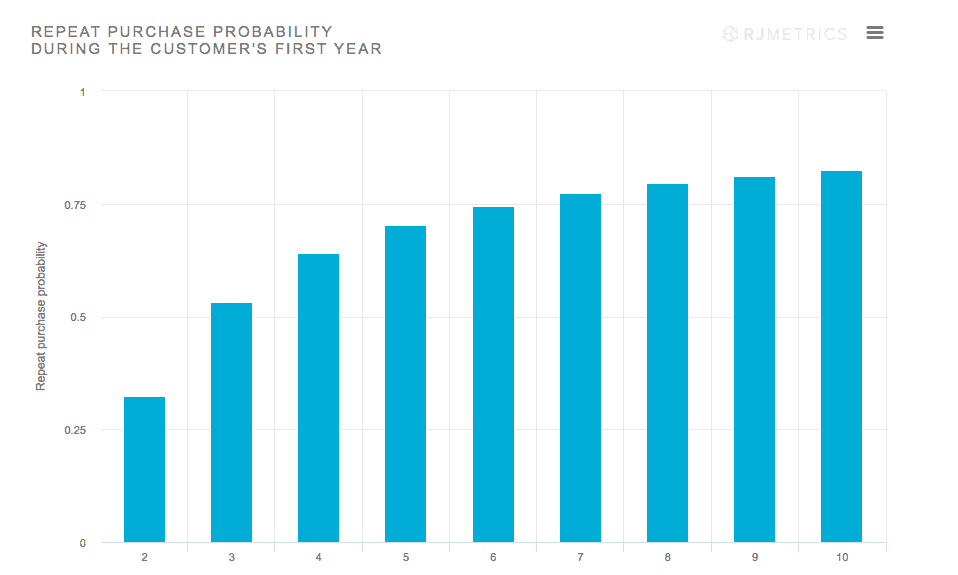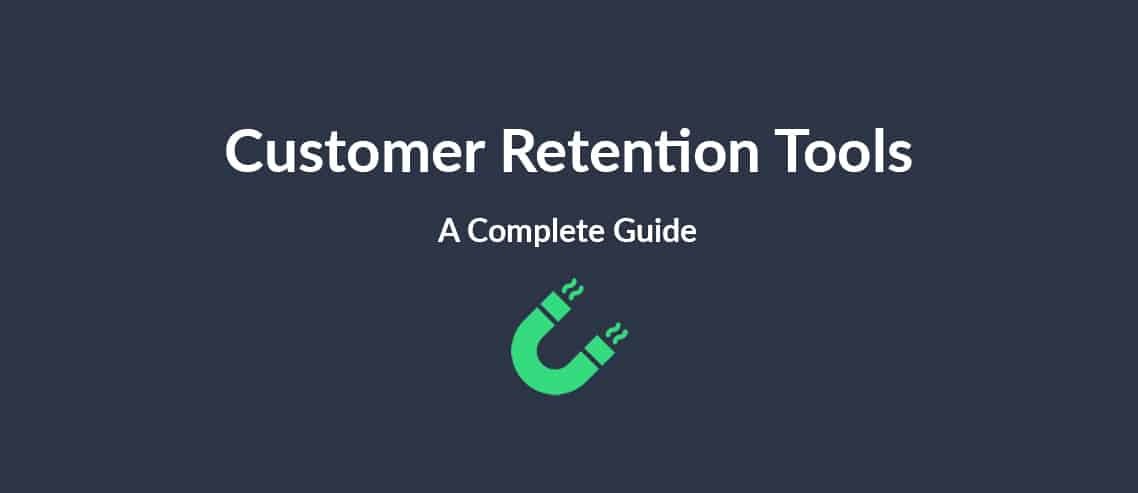If you’ve achieved to attract visitors to your store and gained a sustainable traffic, then you should think the next step which will be about converting visitors to actual customers and keep them loyal to your store. If you are succeed in improving customer loyalty and bring them the second time to make a purchase, the chance of making the third, fourth purchases are really high. According to the research, the likelihood of a third purchase jumps past 50% after the second purchase.
You can see the chart of the data at below from the RJMetrics research.

Online customers are always feeling pain when they finalize the purchases. That’s the consumer psychology! They may be concerned with spending too much money, or they are afraid of getting the wrong product for their needs, without any price consideration. If the retailer can help online customers to get rid of this pain, it means that the first steps of long-run relationships are taken. Customer loyalty motivates online shoppers to come to the store more consistently, spend a greater amount of money, feel positive about their shopping experience and be the advocate of the brand among their circle which leads a great word-of-mouth effect.
That’s why you should think customer loyalty like a puzzle. Many different components like the quality of the product, support, delivering the product, incentives and rewards define the customer loyalty and retention. But, among all these components, pricing and pricing strategies play a crucial role.
Focus on top selling products, the rest will come…
If you are aiming to compete better with the rivals or keep your leadership position in the market, keeping existing customers coming in and also attracting new customers are mandatory.
Let’s go with the first pricing strategy that will help you to reach that goal.
In order to keep your existing customers satisfied and acquire new customers, top selling products in each category should be priced equal to or very close to your competitors. This competitive decision allows online shoppers to evaluate your prices against other stores and giving them the sense that your prices are reasonable. Keep in your mind that an average online shopper visit at least 3 websites before making their purchase. So, your customers always think that your prices are fair and keep coming back to check the prices for all of your products. That will increase the brand value and customer loyalty. Also, it enables you to compete more effectively with other retailers in your market.
Other products in various categories can then be priced differently. Then you can make up for margin lost on items that are more aggressively priced. So in brief, enhance your loyalty and brand value with top-selling products while increasing your margins with other products.
Sustaining this strategy in a smart and effective way is possible and much more effective with pricing software. With the power of these smart software like Prisync, you are able to track your competitors’ prices automatically without any hassle. Instead of gathering the data and spending time, you can focus on market trends, competitor monitoring and at last give better strategic decisions.
Besides of the monitoring ability, you can generate smart prices via Prisync by setting repricing rules. For example for that scenario, you can set product based repricing rule to continuously sustain the strategy.
Everyday low price
Everyday low price, also known EDLP, is a pricing strategy that gives a commitment to customers to always have the lowest prices from your store. It is supported by a promise to match the offers of competitors on the identical products. With this strategy, you are able to design your marketing campaigns to let online shoppers and customers know that you are always offering the best deals. So, instead of setting discount days, promoting the deals, which lead a great effort, you can just focus on your one message!
From the customer perspective, it is also a beneficial and applicable way to establish customer loyalty. This strategy facilitates the purchase decision of online shoppers as they do not have to spend their time to find the lowest price. The better thing, customers do not have to wait for special shopping days to get the deals and also avoids post-purchase regret. If they are searching a product for a low price, they will know where to knock the door!
But, be careful if you decide to set this strategy. As mentioned above you have to know your customer profile. You can link with consumers who make buying decisions based on price.
But don’t set just for one time and leave alone your everyday low price products. They might be too competitive relative to your closest competitor so even lifting the price by 5% or 10% doesn’t really affect the performance of your competitive position. This is an opportunity to test a price increase, improving your profit margins and still be the best deal in the market.
The best way to detect that opportunity is using an automated competitor price tracking software. By gathering price intelligence data from the market, you’ll have a clear view of your price positioning towards the closest competitor.
Differential Pricing
Every e-commerce retailer has different customer groups demanding different needs and expectations. That’s why throwing the discounts or rewards randomly is not a sustainable and logical way to gain loyalty.
Differential pricing is a concept in which a product is priced differently based on various segments like the customer group, location, type of product or quantity of product purchased, different circumstances… By applying differential pricing, the chance of boosting the loyalty towards these different groups will increase incrementally as you are customizing the treat towards different segments.
E-commerce retailers can set special prices for different groups. Let’s go through with creative examples.
- Set a discount of %20 on a PlayStation game for students who had +3 purchases from you at past.
- Give a %25 discount for next purchase for online shoppers who had not made a purchase in last month.
- Give a %30 discount on chairs for customers who bought a table in last 2 weeks.
By adopting this mindset you’ll be able to establish a strong relationship with customers and bring back them for the second time. If an online shopper knows they can get special surprises from your store, they’re more willing to be loyal to your store.
The impact of pricing on customer satisfaction
So far, we’ve given applicable pricing tips that enhance the customer loyalty. Now, we are going to analyze the relationship between pricing and customer satisfaction and how they support each other.
Let’s start with an example;
Imagine that you are an e-commerce retailer selling big and small home appliances. According to the research – The influence of price fairness on customer satisfaction of Hermann et al. (2007), the overall satisfaction of an online shopper is directly related how you priced your products. To be more clear, if you charge high prices for your home appliances products, the satisfaction level and expectations of the customers are proportionally high. In that scenario, the customers will expect quick delivery, installment of the product, repair service and instant customer support as they are perceiving the overall experience of shopping should be satisfying because of the high price.
We are not living in a utopic world in where the prices are low, the quality of products is high and the support is perfect and you should demonstrate this fact by providing a great experience and satisfying them.
But how you can manage this with pricing?
In order to deliver an excellent customer experience, you need to create a financial resource to support and design the optimal experience. Increasing your prices will let you allocate adequate budget for that goal. Then, quick delivery, instant support, and repair services can be provided. In the worst scenario; charging high prices while delivering unsatisfying experience will result in poor customer satisfaction.
Good news is coming! According to the research – Customer Satisfaction and Price Tolerance of Anderson (1996), great customer experience decrease the price sensitivity. It means that if the customers are satisfied with the overall shopping experience, price becomes less of a factor.
Conclusion
So, if you want to make your customers return again to your store and let them purchase your products continuously, you have to facilitate their bottlenecks and satisfy their needs by treating them in a different way.
We hope these pricing strategies and finding have inspired you and given ideas. Try to apply them and let us know. We would be more than happy to hear your stories.
customer relationships


Leave a Reply